|
|
|
Sort Order |
|
|
|
Items / Page
|
|
|
|
|
|
|
| Srl | Item |
| 1 |
ID:
151298
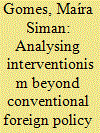

|
|
|
|
|
| Summary/Abstract |
Most of the analysis dealing with so-called “emerging powers” in the field of peace and security seek to explain the intentions and motivations (supposedly) behind these states’ foreign policy and changing normative positions. Several of those studies see foreign policy decisions as the result of rational processes, defined by a “means-and-ends” logic, essentially oriented by preconceived national interests, clear ideational precepts and fixed identities. Through a non-conventional analysis of the participation of Brazil in the United Nations Stabilization Mission in Haiti (MINUSTAH), the paper aims to advance an understanding of foreign policy as an identity practice that, especially in moments of domestic identity crisis, helps reinforce and stabilize specific representations of the state self and of those acting in its name. Informed by a post-positivist approach, the case discussed in the paper opens some avenues to explore how interventionism can be analysed beyond traditional foreign policy rationales and mainstream international relations theories.
|
|
|
|
|
|
|
|
|
|
|
|
|
|
|
|
| 2 |
ID:
185302
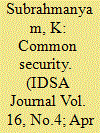

|
|
|
| 3 |
ID:
158000
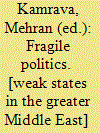

|
|
|
|
|
| Publication |
London, C Hurst and Co. (Publishers) Ltd, 2016.
|
| Description |
vii, 317p.pbk
|
| Standard Number |
9781849044820
|
|
|
|
|
|
|
|
|
|
|
|
Copies: C:1/I:0,R:0,Q:0
Circulation
| Accession# | Call# | Current Location | Status | Policy | Location |
| 059347 | 956.054/KAM 059347 | Main | On Shelf | General | |
|
|
|
|
| 4 |
ID:
127052
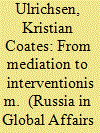

|
|
|
|
|
| Publication |
2013.
|
| Summary/Abstract |
During the first two years of the Arab Spring, Qatar's regional posture went into "overdrive," initially in Libya and subsequently in Syria. The country took advantage of the unique niche which it had spent years crafting in order to play an astoundingly high-profile and increasingly controversial role in the uprisings. Initially, it displayed unprecedented regional leadership bordering on outright activism in responding to crises across the Arab world. This greater self-confidence reflected multiple factors, including (relative) domestic stability and a progressive form of governance, as well as the ability to take and execute decisions quickly and the aforementioned experience in mediation. As a result, at the onset of the Arab Spring protests across the Middle East and North Africa, Qatar boasted a distinctive combination of characteristics rare in the Arab world, including regionally and internationally recognized legitimacy, a relatively progressive stance towards governance, an ability to make swift policy decisions, and extensive experience in mediation. All of these factors positioned Qatar to assume an extraordinarily visible and interventionist role during the Arab Spring upheaval.
|
|
|
|
|
|
|
|
|
|
|
|
|
|
|
|
| 5 |
ID:
131420
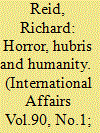

|
|
|
|
|
| Publication |
2014.
|
| Summary/Abstract |
This article examines the international engagement with Africa from the First World War and the apex of colonial rule through to the present day. It is argued that there have been dramatic shifts throughout this period-from increasing interventionism on the part of the colonial state, to decolonization and the emergence of nation-states with independent foreign policy programmes, to the predations and influences of the Cold War, to the developmentalism and humanitarianism of the contemporary era. Yet, there has also been marked continuity in terms of policy, perception and practice. In particular, Africa has long been seen in terms of economic opportunity-a place where markets and raw materials abound-and of military and political threat, a place in which intrinsic instability makes external intervention both desirable and inevitable. While immediate contexts have changed over time, the international engagement with the continent remains essentially economic and military. A concern for democratization and development represents a relatively new element, although even this can be traced to the paternalistic humanitarianism of the colonial era and, earlier still, moral stances toward Africa in the nineteenth century.
|
|
|
|
|
|
|
|
|
|
|
|
|
|
|
|
| 6 |
ID:
131103
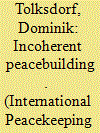

|
|
|
|
|
| Publication |
2014.
|
| Summary/Abstract |
Between 2002 and 2008, the European Union simultaneously applied interventionism and the promotion of local ownership as policy approaches in its peacebuilding efforts in Bosnia and Herzegovina. This article introduces an analytical framework to evaluate the coherence of the EU's policies and applies this framework to two case studies involving the police sector: the EU's support to the fight against organized crime and to negotiations on a police reform. The article concludes that the two policy approaches applied by the EU were incoherent and that this incoherence contributed to the failure to achieve police restructuring in Bosnia.
|
|
|
|
|
|
|
|
|
|
|
|
|
|
|
|
| 7 |
ID:
133636
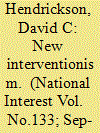

|
|
|
|
|
| Publication |
2014.
|
| Summary/Abstract |
WHEN HE RAN for president in 2008, Barack Obama promised a new era of restraint in U.S. foreign policy. And in some respects, he has indeed been more restrained than his predecessor. But those looking for a reconsideration of America's universalist ambitions have been disappointed by Obama's record. Where it has mattered, there has been no retreat from the revolutionary ends to which George W. Bush committed the United States in his second inaugural address in 2005. Thus Obama (after much agonizing) threw in his lot with those seeking to overthrow Libya's Muammar el-Qaddafi by force. Thus Obama called for Bashar al-Assad to leave, encouraged "allied" efforts to overthrow him and made negotiations to end the civil war in Syria dependent on his departure. And thus the Obama administration (with the president himself curiously in the shade) played a key role in supporting the Maidan's overthrow of Ukraine's elected president, Viktor Yanukovych
|
|
|
|
|
|
|
|
|
|
|
|
|
|
|
|
| 8 |
ID:
144299
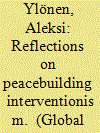

|
|
|
|
|
| Summary/Abstract |
In 2005 Southern Sudan emerged from a long period of protracted civil war. The Comprehensive Peace Agreement marked the beginning of a period of post-war peacebuilding concentrating on statebuilding. However, since 2005, the much-needed gradual process of building a unified nation and inclusive national identity has been largely neglected. Instead, there has been emphasis on achieving ‘peace-through-statebuilding’ that has contributed to a highly exclusive social, economic, and political order dictated by the leadership of the dominant rebel movement turned government, the Sudan People's Liberation Movement/Army (SPLM/A). This essay reflects on peacebuilding interventionism, and state- and nationbuilding in Southern Sudan since 2005. It argues that this overall process dictated by the SPLM/A leadership, focusing on security and state, excluded the majority of Southern Sudanese from the peace dividend and economic and political opportunities. Further, the exclusive top-down SPLM/A-centric view of the nation marginalized part of the population and contributed to the continuing political instability and armed violence orchestrated by the leading individuals and other military men.
|
|
|
|
|
|
|
|
|
|
|
|
|
|
|
|
| 9 |
ID:
097125
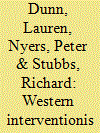

|
|
|
|
|
| Publication |
2010.
|
| Summary/Abstract |
As we move further and further into the twentieth century, the Western 'global governance' norm of interventionism is being challenged by East Asian norm of non-interference and territorial integrity. The two sets of norms are historically and philosophically rooted and have influential backers. Intriguingly, while the two approaches appear irreconcilable, some countries have lent their support to both sets of norms. As East Asia emerges as a major force in global relations can a way be found for the two sets of contrasting norms to exist side-by-side, perhaps each governing particular regional relations, or is it even possible that a compromise set of 'global' norms might be developed?
|
|
|
|
|
|
|
|
|
|
|
|
|
|
|
|
|
|
|
|
|